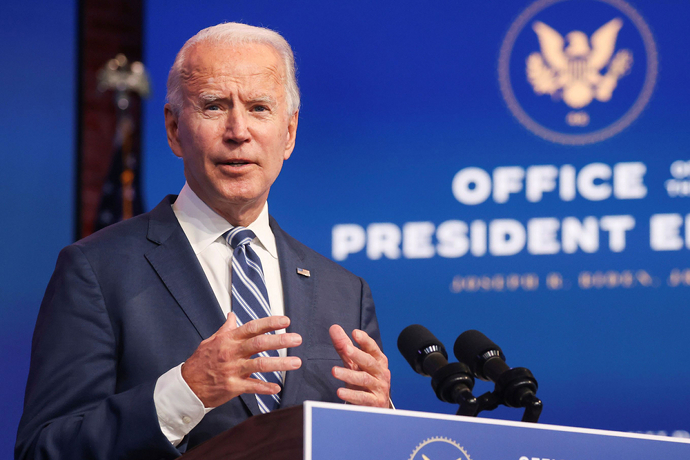Biden’s plan to create jobs and tax the rich is a good deal bolder than it looks at first glance. Shutterstock photo.
FDR must be smiling
by Sam Pizzigati
President Joe Biden has made no secret of his admiration for Franklin D. Roosevelt. The president proudly displays a portrait of FDR in the Oval Office.
More significantly, he’s announced the most ambitious plan since FDR’s New Deal for enhancing the well-being of working Americans while trimming the fortunes of America’s super rich. The president has promised to fund his big plans for infrastructure, jobs, and education entirely with taxes on the top.
In fact, Biden’s new tax-the-rich plan is a good deal more Rooseveltian than the numbers, at first glance, might suggest.
In 1945, FDR’s last year in office, the nation’s most affluent faced a 94 percent tax on income over $200,000, a little more than $2.9 million in today’s dollars. The rates Biden has proposed come nowhere near those — they’d top out at just 39.6 percent of ordinary income over $400,000. That’s up only slightly from the current 37 percent.
But the gap between Biden’s plan and FDR shrinks big-time when we toss capital gains — the dollars the rich make buying and selling stocks and bonds, property, and other assets — into the picture.
In 1945, the nation’s deepest pockets paid a 25 percent tax on their capital gain windfalls. Today’s rate tops off at 20 percent. For households making over $1 million in annual income, the Biden plan would raise the top capital gains tax rate to 39.6 percent, the same top rate that applies to earnings from employment.
In other words, the Biden tax plan ends the most basic tax break for the ultra rich: the preferential treatment they get on the income from their wheeling and dealing. This would be a big deal. In 2019, 75 percent of the benefits from the capital gains tax break went to America’s top 1 percent.
Dividends currently get the same preferential treatment. Americans making over $10 million in 2018 took in over half of their total incomes — 54 percent — via capital gains and dividends. If Congress adopts the Biden tax plan, the basic federal tax on that 54 percent would just about double, from 20 to 39.6 percent.
The Biden plan also totally eliminates the federal tax code’s open invitation to dynastic family wealth: the “step up” loophole. Under this notorious giveaway, any fabulously wealthy American sitting on unrealized capital gains can pass those gains onto heirs tax-free. The Biden plan short-circuits the simplest route to dynastic fortune.
Under Biden’s tax plan, new dynastic fortunes would have a much harder time taking root. Already existing dynastic fortunes, on the other hand, would still be with us. Biden — like FDR in his day — has not yet warmed to the idea of a wealth tax.
Senator Elizabeth Warren led a recent hearing highlighting the enormous contribution that even a 2 percent annual tax on grand fortunes could make. Among the insightful witnesses at the hearing: the 61-year-old Abigail Disney, the granddaughter of Roy Disney, the co-founder of the Disney empire with his brother Walt.
“I can tell you from personal experience,” Abigail Disney told senators, “that too much money is a morally corrosive thing — it gnaws away at your character… It warps your idea of how much you matter, and rather than make you free, it turns you fearful of losing what you have.”
Franklin Roosevelt understood that debilitating dynamic well enough to propose, in 1942, a 100 percent tax on annual income over what today would be about $400,000. Biden hasn’t ventured anywhere close to that level of daring. But he’s certainly come much further than anyone could reasonably have expected.
Contact us by email at fund4thepanamanews@gmail.com
To fend off hackers, organized trolls and other online vandalism, our website comments feature is switched off. Instead, come to our Facebook page to join in the discussion.
These links are interactive — click on the boxes












